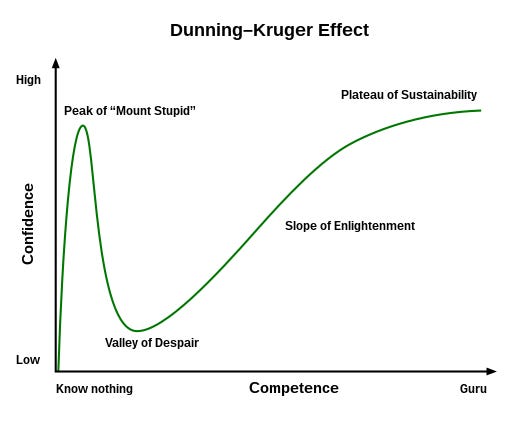Tracking Progress
That which gets measured gets improved! What to track and why for better progress.
When I first started lifting consistently I had no knowledge of exercise, nutrition, or periodization. I trained in higher rep ranges using a little sheet given to me by my track coach— I only used machines BUT he was adamant that I write everything down.
I improved! I got stronger over time and my running improved because of it.
Fast forward 5 years to when I got BACK into lifting after a running hiatus, my goals had changed— now I had the necessary knowledge to be successful, or so I thought.
The Dunning-Kruger effect explains my confidence at this point in my life so well.
A simple graph of how confidence to speak on a subject develops depending on experience and knowledge. It states that people tend to overestimate their cognitive ability until their competence increases to the point where they become aware of their shortcomings.
Sidebar aside—? My lifting journey had set off, I was consistent with my lifts and exercise selection, and I practiced progressive overload both in intensity and volume. Everything was set to create the body I wanted both aesthetically and in terms of strength.
Fast forward ~12 weeks after the start of my training— I had made minimal strength gains, and no changes in size. Timing clearly plays a role here, in the grand scheme of things 12 weeks is not a lot of time.
Where I place the blame is my inability or reluctance to track my progress. I remember often forgetting what weight I had used the week before or if I had changed an exercise, I can’t say that I had gotten good sleep, definitely was not hydrated and I didn’t track my calories to make sure I had hit my goals for the day.
I placed way too much trust in my biased intuition instead of writing objective values down on a sheet of paper.
Tracking can be a very simple thing— and it certainly doesn’t need to be every detail of every second of each day. Turns out my old track and field coach new a thing or two; that which gets measured gets improved. Keeping tabs on a number of things resulted in… better results.

My training changed immensely when I introduced the following changes to my lifestyle:
Tracking sleep and finding things that affect my sleep. This doesn’t mean I get 8 hours every night, but it does make me aware of sleeping habits that either positively or negatively affect my sleep. For instance, I know that if I eat a really high protein meal before bed I have lucid dreams and feel groggy the next morning— I don’t know why, but that’s my anecdote. Find what affects your sleep and you’ll sleep better simply by paying slightly closer attention to it. I check my sleep daily when competing, maybe once to twice a week on the regular through my Garmin *People tend to complain that these are inaccurate however I find mine does just fine— and if it doesn’t as long as I use the same inaccurate but consistent measure I get a good picture!
Tracking progression through weights, reps, and maybe most importantly perceived effort. I typically use the RPE scale of 1-10, 10 being the hardest. I also track how I feel going into a lift. This allows me to actually track my performance in the gym— I pair this with proper planning and have a general idea of what a session will look like PRIOR to going in. DEADLY.
Photo by Pickled Stardust on Unsplash Tracking food— This one is sticky, it is hard for many individuals to track and it can be associated with disorderd eating. However, my experience has been nothing but positive when trying to gain or lose while tracking calories. As an added bonus knowing the nutrients in my food has allowed me to maintain weight intuitivley WITHOUT tracking daily. The app I like to use is CARBON. (We’re not sponsered— BUT I wouldn’t mind… @Layne Norton)
Completely unrelated to lifting but I created a habit tracker in a dotted journal to track anything from daily mood, hydration, steps in day, supplementation, you name it. This may be above and beyond, but it is my single most useful tool as far as progress goes because it holds me accountable on a dialy basis and all I do is check a box— I know I said it didn’t have to be daily AND it doesn’t… I just genuinely enjoy doing this one daily.
Tracking is important for progress— find what methods work for you and hold yourself accountable— feel free to reach out for more info or tips!





